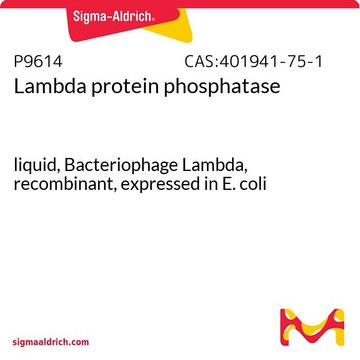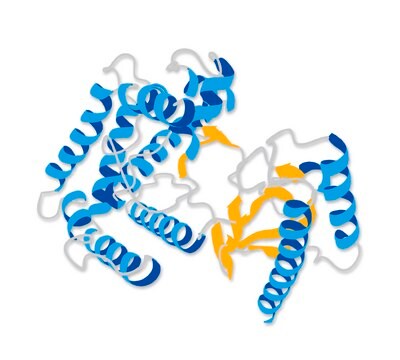推荐产品
生物源
bovine brain
品質等級
化驗
>90% (SDS-GE)
形狀
buffered aqueous glycerol solution
比活性
~1000 units/mg protein
分子量
42-45 kDa
包裝
vial of 1 μg
技術
ligand binding assay: suitable
UniProt登錄號
運輸包裝
dry ice
儲存溫度
−70°C
基因資訊
bovine ... PPP2CA(282320)
一般說明
Protein phosphatase 2C (PP2C) is a member of protein phosphatases, Mg2+/Mn2+ dependent (PPM) family. PP2C is a monomeric enzymes found in both prokaryotes and eukaryotes.
生化/生理作用
In Arabidopsis, protein phosphatase 2C (PP2C) negatively regulates plant hormone, abscisic acid (ABA) signal transduction. In eukaryotes, this protein modulates the cell cycle by reversing the activating phosphorylation of cyclin-dependent protein kinases (CDKs). PP2C acts as a crucial physiological regulators of cell growth and of cellular stress signaling.
單位定義
One unit will release 1.0 nanomole of phosphate from 32P-labeled myelin basic protein at pH 7.0 at 30 °C
外觀
Solution in 50 mM Tris-HCl, pH 7.0, containing 14 mM 2-mercaptoethanol, 1 mM benzamidine, 0.1 mM PMSF, 1 mM EDTA, and 50% glycerol
訊號詞
Warning
危險聲明
危險分類
Skin Sens. 1
儲存類別代碼
10 - Combustible liquids
水污染物質分類(WGK)
WGK 2
閃點(°F)
Not applicable
閃點(°C)
Not applicable
A protein phosphatase 2C involved in ABA signal transduction in Arabidopsis thaliana
Meyer K, et al.
Science, 264, 1452-1455 (1994)
Role of type 2C protein phosphatases in growth regulation and in cellular stress signaling.
Lammers T and Lavi S
Critical Reviews in Biochemistry and Molecular Biology, 42, 437-461 (2007)
ABI1 Protein Phosphatase 2C Is a Negative Regulator of Abscisic Acid Signaling
Gosti F, et al.
Plant Cell, 11, 1897-1910 (1999)
Plant PP2C phosphatases: emerging functions in stress signaling.
Schweighofer A, et al.
Trends in Plant Science, 9, 236-243 (2004)
我们的科学家团队拥有各种研究领域经验,包括生命科学、材料科学、化学合成、色谱、分析及许多其他领域.
联系技术服务部门








